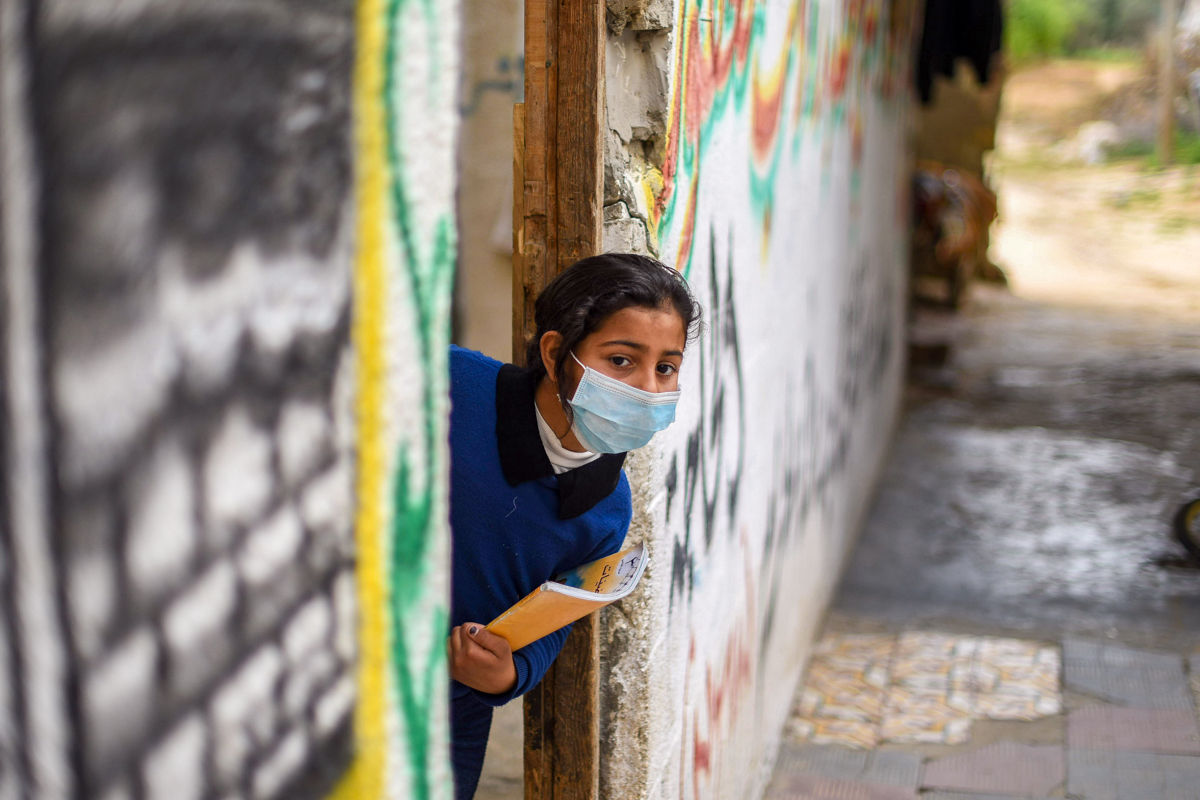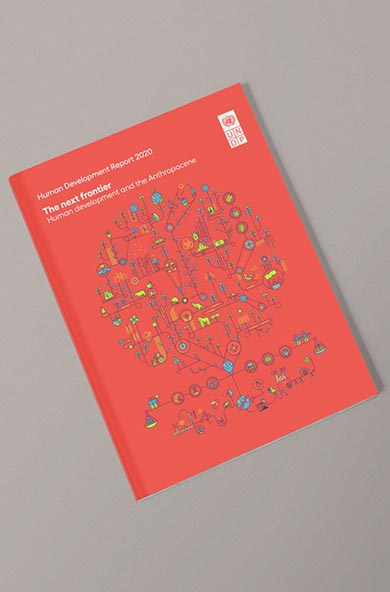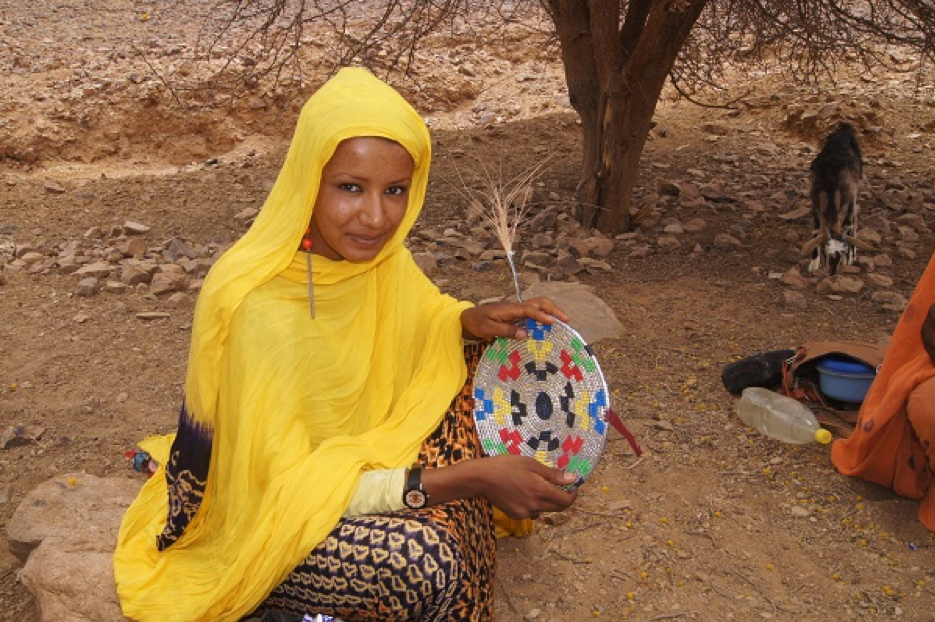
Youth development in the Arab region has received considerable attention over the past decade. The Arab States region is home to more than 113 million young people between the ages of 15 and 29 — making up to 25 percent of the Arab region’s population, the largest youth group ever.
The large presence of youth in Arab countries is critical to the region’s economic, social, and cultural development. Youth have proven to be a catalyst for change in societies as they are eager to learn and play an active role in bringing about change and contributing to development. Empowering youth enhances their active participation in society and helps to build forward better.
The Arab States region is highly vulnerable due to climate risk and has the highest dependence on food imports and water scarcity in the world. As a result, green transition solutions are essential to accelerate climate action in the region and combat climate change. The green transition is a good opportunity for youth, as it will create millions of jobs in the region. Youth should acquire green skills to participate in the green transition.
What are Green Skills?
Green skills are the knowledge, skills, values, and attitudes needed for a sustainable and resource-efficient society. These skills are required to implement environmentally friendly solutions. The shift toward an environmentally sustainable and climate-friendly world is critical not only to responding to the global climate crisis, but also to achieving the Sustainable Development Goals (SDGs).
On #YouthDay, learn more about the countries in the Arab region that are supporting youth to use their green skills for a more sustainable future.
Iraq

Iraq’s innovation mission where they presented on the importance of AI in cultivating green skills among youth in Iraq.
Artificial intelligence (AI) can play a significant role in cultivating green skills among Iraqi youth, enabling them to contribute to sustainable development and tackle environmental challenges.
This is where UNDP Iraq, through its UNDP Accelerator Lab, took the initiative to merge AI with green skills, offering Iraqi youth a transformative opportunity to emerge as eco-tech innovators. By mastering AI tools tailored for environmental analysis, these young minds were equipped with the knowledge on how to embark on a revolution to address waste reduction, optimize energy, advance farming practices, and ensure ecosystem monitoring. This vision was achieved by hosting a first-of-its-kind initiative in Iraq called the 'Innovation Mission Competition,' providing Iraqi youth with the necessary AI skills to craft sustainable solutions.
In the Innovation Mission Competition, a variety of creative solutions emerged. Two standout examples are the Haqlna and Rihanna projects, that vividly showcased the impact of AI and Green skills in this context.
The Haqlna Project
Mohammed Jamal, a young Iraqi from the city of Mosul in northern Iraq, identified challenges related to the quality and availability of cattle feed in the region. Practitioners engaged in cattle feed farming faced several hurdles, including restricted access to water, excessive water usage, soil salinity, slow production due to the specific seasonal requirements for feed cultivation and inefficient distribution channels for the cattle. To solve these problems, Jamal and a youth skilled in artificial intelligence (AI), named Raghad Ahmed came up with Haqlna, a project that introduced innovative cabins designed for accelerated and healthier cattle feed growth. This approach empoweredfarmers to obtain 7kg of cattle feed in 7 days, using only 1kg of seeds. AI played a pivotal role in this, creating an optimal environment for high-quality and efficient cattle feed production.
The project’s contribution extends beyond the reduction of water consumption, as these innovative solutions not only addressed s the challenges faced by cattle feed farmers but also provided wholesome feed for cattle, who form an integral part of our ecosystem.
The Rihanna Project
Husam Falih, a young Iraqi from Baghdad, dedicated to addressing the challenge of water wastage in the production of vegetables and fruits across Iraq, developed an innovative solution involving vertical farming techniques powered by solar cells, resulting in the year-round cultivation of vegetables and strawberries. This approach utilizes 70% less water compared to traditional methods, eliminating the need for chemical products. Significantly, this sustainable approach not only yields high-quality and flavorful produce but also integrates artificial intelligence for disease detection and treatment of the plant.
Husam is supported by Mustafa Nafea, a skilled youth in AI, and Mohammed Khalid, a practitioner specializing in solar cell technology.
Lebanon

Libana Geagea, a young entrepreneur, from Lebanon, established her recycling startup “Recyco”, amid one of the most challenging times in Lebanon. Through financial assistance and an extensive training program provided by UNDP Lebanon and KfW Development Bank, Libana was able to expand her business. By establishing a successful business model in solid waste management, she became a model of a young Lebanese entrepreneur investing in her country’s potential.
Yemen

Thuria is a community and environmental activist who works as a grants and partnerships officer for an organization that supports youth-led initiatives. She is also a member of several community initiatives that are working to address the plastic pollution crisis in Yemen. She started her own project, called "Art from Waste”, which uses recycled plastic to create art pieces that raise awareness about plastic pollution.
She has created many beautiful art pieces that have been featured in exhibitions and sold to raise money for environmental initiatives. She has also inspired other people to start their own projects to address the plastic pollution crisis.
UNDP’s Youth Leadership Programme (YLP) in Yemen collaborated with Youth Leadership Development Foundation (YLDF) to support Thuria to establish a plastic waste recycling workshop to produce innovative products. The workshop produces innovative products that meet market needs such as toys, women's bags, home accessories, carpets, frames, and bouquets.
Another example in Yemen is Amina, an environmental activist who is passionate about green innovations which drive sustainable economic development and preserve the environment.

Amina noticed that single-use plastic water bottles are used widely in Yemen because they are cheaper and more available than glass bottles. She started keeping track of how they are disposed and discovered that people collect these bottles to earn a living.
She invented a new innovative solution: mixing recycled plastic water bottles with cement to produce building block bricks. She found that plastic bricks have a great advantage over other materials: they are hard, durable, light weight, and have the same thermal insulation properties as traditional red clay bricks.
UNDP Yemen supported her to test her innovative solution and complete it. She conducted experiments needed to make the perfect plastic brick formula that met her needs.
A third example from Yemen is Ethar, a 23-year old Yemeni woman from Aden, who developed a creative idea to turn organic waste into organic fertilizer for agricultural land.

The aim of her project is to reduce the accumulated waste in cities, as well as air pollution caused by burning waste as a removal practice. This practice adversely affects both the environment and community.
Investing in green skills
Investment in youth represents the hope of today and the reality of tomorrow, and it must be continued to build a brighter future.
Arab countries should prioritize the expansion of the frontiers of opportunity among young people. Investment in youth participation recognizes the active and positive contribution of young people to society.

As the Arab region hosted COP27 in Egypt and COP28 will be hosted in United Arab of Emirates, it is time to involve youth in the green transition and invest in several initiatives to provide them with green skills.
Stay tuned for the forthcoming call for application by the Knowledge Project to develop your green skills. The regional skills initiative, that will be launched soon in partnership with the Mohammed bin Rashid Al Maktoum Knowledge Foundation (MBRF) and Coursera, aims to equip more individuals with the skills needed to be part of this green and sustainable development.
On International Youth Day, let’s recognize the important role of youth and empowering them with new green skills for a better green sustainable future in the region.

 Locations
Locations












